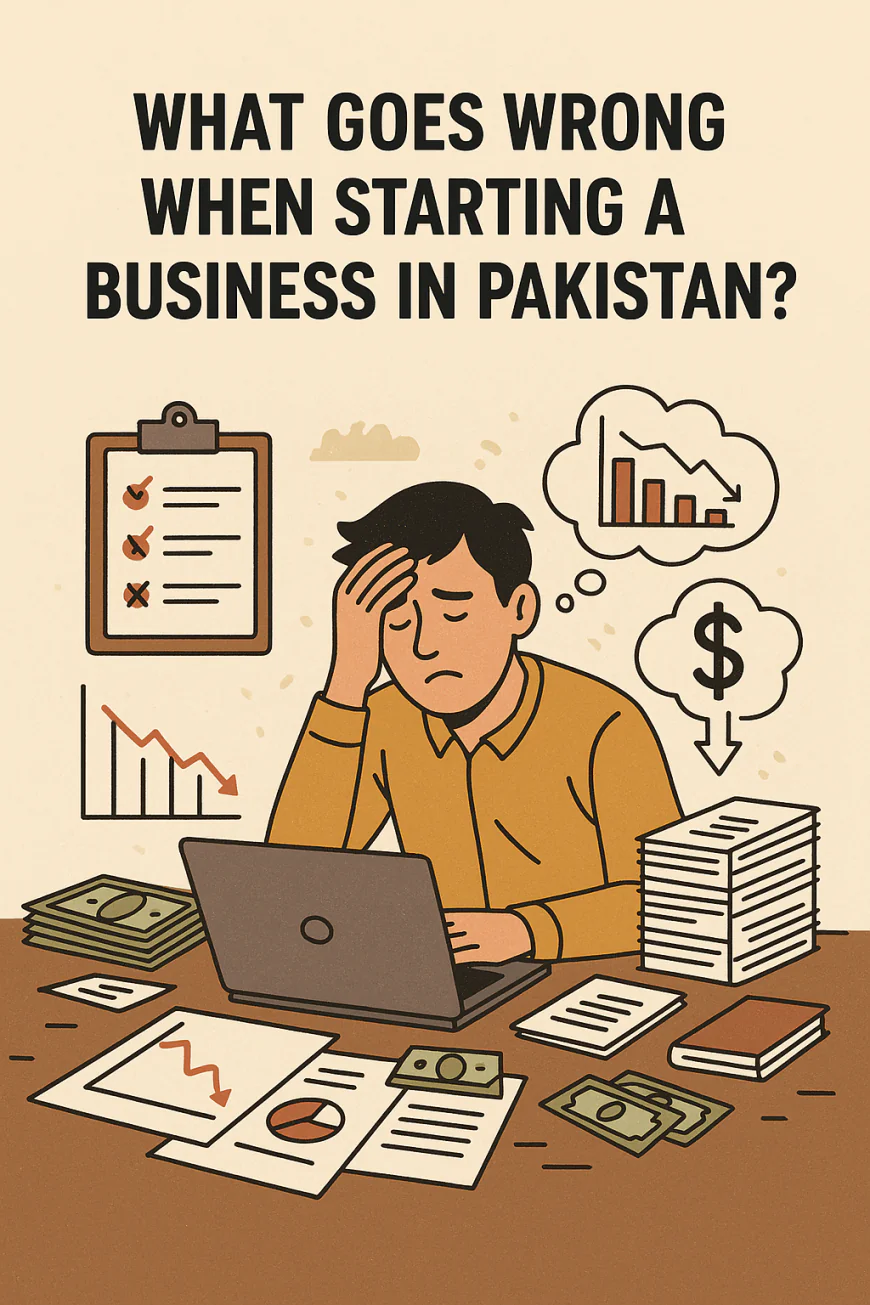How to start a successful business in Pakistan and What Goes Wrong When Starting a Business in Pakistan? A Reality Check for Aspiring Entrepreneurs
Starting a business in Pakistan is exciting but often riddled with pitfalls. Many entrepreneurs fail due to poor market research, a lack of understanding of supply and demand, copycat business models, weak financial planning, and ignoring legal formalities. This blog highlights these common mistakes and provides a practical, step-by-step guide to launching a successful business — from identifying real market needs and testing ideas to registering legally and building a strong marketing strategy. The key message: combine passion with preparation to build something that lasts.

Pakistan’s entrepreneurial spirit is alive — just look around and you’ll find a new café, Instagram store, or clothing brand popping up every other week. But let’s be honest: for every business that thrives, ten quietly die. Why do so many fail? And more importantly, how can you start a business in Pakistan the right way?
Let’s dive into the common pitfalls — and then walk you through a realistic, step-by-step guide to launching a business that actually works.
❌ What Goes Wrong in Starting a Business in Pakistan
1. No Market Research — Just Vibes
People start businesses based on what they like — not what the market needs. Just because a product works in Lahore doesn't mean it’ll work in Peshawar. Without asking key questions like:
-
Who is my customer?
-
What problem am I solving?
-
What’s the current demand and who are my competitors?
You’re basically launching a business blindfolded.
2. Misunderstanding Supply and Demand
Many don’t understand how prices, product availability, and customer behavior shift with supply and demand. They:
-
Buy too much inventory without a sales strategy.
-
Set random prices without considering cost structures or competitor pricing.
-
Ignore seasonal trends and buyer psychology.
The result? Low sales, high losses, and eventual burnout.
3. Copy-Paste Business Models
From same-same clothing brands to carbon-copy chai dhabas, too many ventures look and feel identical. Without a Unique Selling Point (USP), you’re just one more option in an ocean of sameness. And in today’s economy, blending in is a death sentence for brands.
4. Poor Financial Planning
Many first-time entrepreneurs:
-
Have no idea of break-even points.
-
Don’t track expenses properly.
-
Don’t separate personal and business income.
This leads to overspending, under-investing in growth, and ultimately, collapse.
5. Skipping Legal Formalities
Operating without registering your business, avoiding taxes, or skipping official documentation may seem “easy” — but it locks you out of:
-
Business bank accounts
-
Government loans and grants
-
Corporate clients or scaling opportunities
It’s like trying to build a house on sand.
6. Unrealistic Expectations
Social media has glamorized entrepreneurship. Many expect quick success, but the truth is:
-
Most businesses take 1–3 years to become stable
-
You’ll face months of low sales, customer complaints, and financial pressure
If you’re not mentally prepared, frustration sets in fast.
✅ So, How Can You Start a Business in Pakistan the Right Way?
Let’s break it down — step-by-step, with real-world relevance.
Step 1: Identify a Problem to Solve
Great businesses solve real problems. Ask:
-
What do people around me need?
-
What frustrates them about current options?
-
Can I offer something better, cheaper, or faster?
Start with problem, not product.
Step 2: Do Market Research
Use Google Trends, Instagram, Daraz searches, and field surveys to answer:
-
Who’s your competition?
-
Who are your ideal customers?
-
How big is the market?
-
What price range are people willing to pay?
Don’t just ask friends for feedback — talk to potential buyers.
Step 3: Write a Simple Business Plan
It doesn’t have to be 30 pages long. Just cover:
-
Your product/service
-
Target audience
-
Cost structure & pricing
-
Sales strategy
-
Break-even timeline
This gives you clarity before you invest a single rupee.
Step 4: Start Small and Lean
Don’t rent a shop or hire a team on day one. Test your idea on:
-
WhatsApp or Instagram
-
Local stalls or pop-ups
-
Freelance platforms or marketplaces
Start with an MVP — Minimum Viable Product — and grow from there.
Step 5: Register Your Business
For legitimacy, funding, and long-term growth:
-
Get an NTN (National Tax Number) from FBR
-
Register your business name with SECP (if going formal)
-
Open a business bank account
-
Keep track of receipts, invoices, and expenses from day one
You can also register under Sole Proprietorship, which is simple and common.
Step 6: Create a Marketing Plan
In today’s market, visibility is everything. Use:
-
Instagram, Facebook, TikTok for organic reach
-
Influencer collaborations for product launches
-
Paid ads once you test what content works
Bonus tip: Create educational content, not just ads. Show your expertise.
Step 7: Keep Learning & Iterating
Track what works and what doesn’t:
-
Are certain products selling faster?
-
Is one audience more engaged?
-
Are your costs sustainable?
Adapt quickly. Business isn’t static — it’s dynamic survival.
🔄 Final Word: Be Ambitious, But Be Prepared
Pakistan needs bold entrepreneurs — but not blind ones. If you dream of launching a business, combine your passion with preparation. Study the market, understand the economics, and start smart.
Failure isn’t always a lack of talent. Sometimes, it’s just a lack of homework.
💬 Thinking of launching something? Let me know in the comments what your business idea is — and let’s brainstorm how to make it bulletproof.









